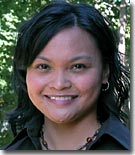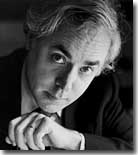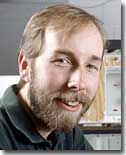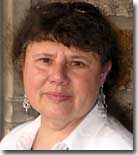What's on Your Nightstand?
Michele Tugade ’95
Assistant Professor of Psychology
I am about to finish Margaret Atwood’s
Oryx and Crake. It is a futuristic novel that is at once a social and political commentary about the current influence of science in our world. Although some have characterized the work as science fiction, Atwood herself considers it “speculative fiction,” which is what first piqued my curiosity about the novel. Another book that I have just started to read is
Between the Acts, which was the last novel written by Virginia Woolf. I have always been a fan of Virginia Woolf. The book was completed before her death, but she was still working on final revisions. The entire novel takes place over the course of a single summer day in 1939 at an English country manor. In this book, Woolf explores emotions, relationships, and social class—she uses these themes to comment on society in the eye of the war.
Richard Wilson
Professor of Music
I have been reading the novels of William Boyd: most recently,
Any Human Heart but before that
The Blue Afternoon and
Stars and Bars. I don’t know how I happened upon him.
The Blue Afternoon more or less fell into my hands off of one of our bookshelves. No word as to how it got there in the first place. I liked it so much that I have been seeking out others. Boyd has been compared to Evelyn Waugh, one of my favorites, but his characters are more intricately drawn. Logan Mountstuart, whose life is richly detailed in
Any Human Heart, has practically joined my family. Boyd is not as wickedly funny as Waugh, but his wit is still very sharp.
John Long
Professor of Biology
The Windward Road: Adventures of a Naturalist on Remote Caribbean Shores by Archie Carr. The environmentalist canon missed this one. While Thoreau’s
Walden, Leopold’s
Sand County Almanac, and Carson’s
Silent Spring under-gird many of our contemporary discussions on human-nature interactions, I’d never heard of Carr’s influential
Windward Road until I was preparing for an AAVC trip to Costa Rica this past summer. We visited Tortuguero, a remote five-mile stretch of still-wild Caribbean beach, to help tag and measure endangered green turtles at their largest nesting site, preserved now as a national park. Once harvested for their eggs and soup-perfect cartilage, green turtle numbers dwindled throughout the Atlantic, compelling Carr, a zoology professor, to seek the whereabouts of their nesting. His quest—to understand basic biology in order to conserve species—is the ideological backbone of the book, and, during his peregrinations, he also describes islands and culture and people 50 years gone. The people who fished the turtle gave Carr his best information, and his willingness to learn natural history from the hunters themselves proved to be his most important contribution to the environmental canon. But the book’s geopolitical influence was accidental: read by publisher William Pepper and distributed to his influential friends, the book spawned the Brotherhood of the Green Turtle, which, under the leadership of John Phipps, created the Caribbean Conservation Corporation that to this day studies and conserves the sea turtles of Tortuguero.
Marque Miringoff
Professor of Sociology
I generally read three kinds of books at the same time: books for my classes, serious fiction, and books just for fun. For my seminar this semester, “Art, War, and Social Change,” I’ve been reading (actually re-reading) Ron Kovic’s 1976 autobiography,
Born on the Fourth of July. Sadly, this brutal unfolding of Kovic’s post-Vietnam experiences, I expect, will be newly echoed in the next round of autobiographies, post-Iraq. For my course on social welfare and social policy I’ve been working my way through two tough new books on poverty: Jason DeParle’s
American Dream and David Shipler’s
The Working Poor: Invisible in America. Both are part expos� and part policy analysis, and may ultimately become part of the great tradition of books like Michael Harrington’s
The Other America. On the more serious fiction side, I’ve been terrifying myself with Philip Roth’s book,
The Plot Against America, trying to imagine Charles Lindbergh as President, and giving myself nightmares. And just for fun—it was great summer reading—I read
Harry Potter and the Half-Blood Prince. I loved it!”
Photo credits: Tugade: Craig Burdett; Wilson: Dixie Sheridan; Long: Will Faller; Miringoff: Daniel Steckenberg ’06




